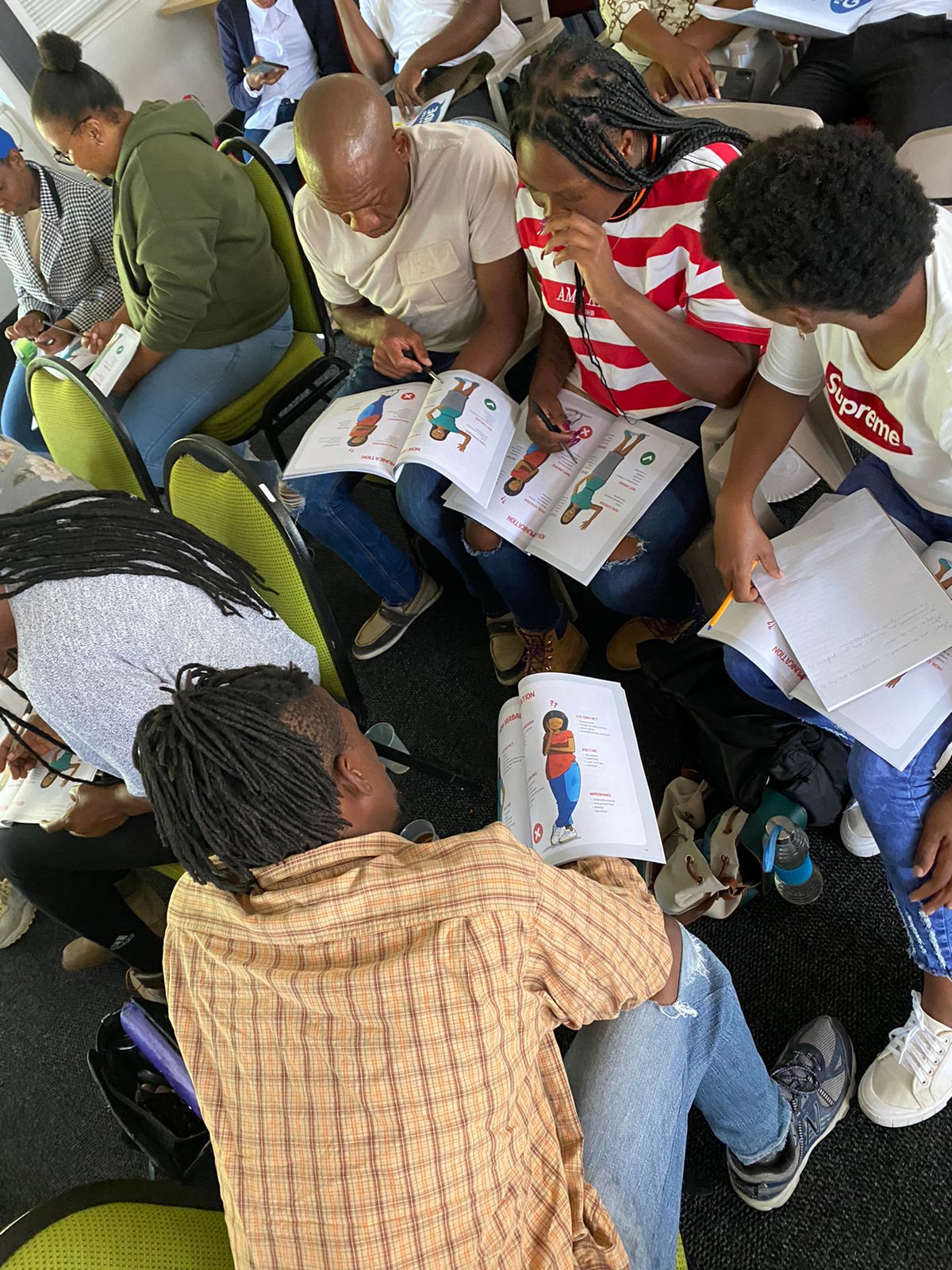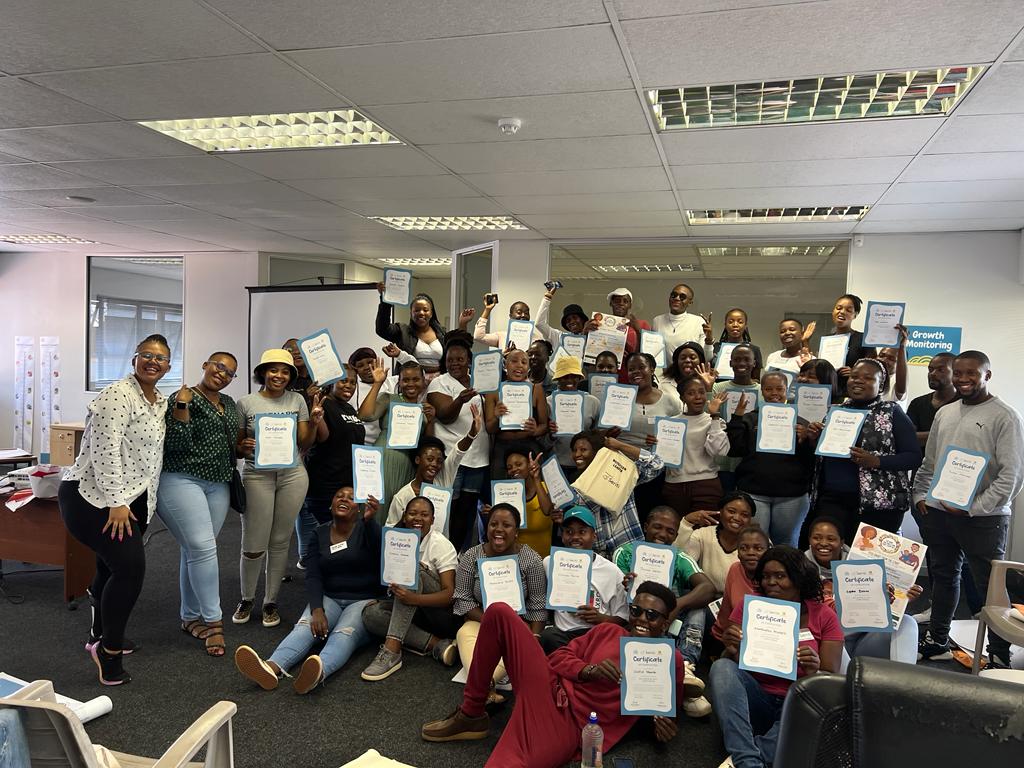What the Data Reveals: Insights and Lessons from the ELPT/Seriti Partnership
27 Sep 2024
In a world where health messaging often feels rigid and didactic, the EAT LOVE PLAY TALK (ELPT) Caregiver Nutrition Programme stands out as a refreshing and transformative initiative. Grounded in the belief that education should be engaging, the programme harnesses the power of play and community to deliver critical public health messages to caregivers and parents across South Africa. By focusing on small, sustainable habit changes, ELPT empowers participants to make healthier nutrition choices for their young children and families, fostering a brighter, more nourished future for all.
Nutrition Leaders: Champions of Change At the heart of the ELPT/Seriti collaboration is a simple yet powerful idea: trained nutrition leaders can be catalysts for change in their communities. These leaders, equipped with comprehensive facilitator skills, bring essential messages to hard-to-reach areas, engaging with community members at early childhood development (ECD) centres, clinics, schools, and food distribution points. Through a partnership with the Seriti facilitation agency, the DO MORE FOUNDATION has successfully trained nutrition leaders across South Africa, who confidently deliver key messages through Seriti’s various programmes, including National Youth Service (NYS), aRe Bapaleng, and Work.Learn.Grow (WLG).
The impact of these leaders is undeniable. Over the past 18 months, 632 participants across five provinces have been trained in the ELPT programme, reaching 15 communities with vital information about healthy eating, loving relationships, playful learning, and language development. The result? A significant boost in confidence and knowledge among participants, with self-reported confidence levels rising from 58.97% to 73.2% after training. This surge in confidence, coupled with a 7.3% increase in correct answers on key message-related questions, underscores the programme’s effectiveness in empowering participants to make a real difference in their communities.
Lesson 1: Pillars of Strength—Focus and Confidence
One of the most striking insights from the ELPT programme is the effectiveness of its core pillars: healthy eating, building loving relationships, playful learning, and language development. Participants consistently reported feeling most confident in discussing nutrition and child health after the training, with nutrition emerging as the area of greatest confidence. This trend highlights the success of the programme’s strategy to focus on a few key pillars rather than overwhelming participants with a broad range of topics. By honing in on these essential areas, ELPT enhances understanding and retention of the messages, demonstrating the power of focused education.
Lesson 2: Playful Collaboration—Adapting to Audience Needs
Play is not just a pillar of the ELPT programme; it’s a dynamic tool that adapts to the needs of the audience. For example, in the aRe Bapaleng groups, where playful learning is a central focus, participants reported high confidence levels in this area. This alignment between the programme’s core pillars and the audience’s intrinsic focus on playful learning highlights the strength of collaboration in delivering effective education. By tailoring the content to resonate with the participants’ interests, ELPT creates a more engaging and impactful learning experience.
Lesson 3: Empowerment Through Storytelling—Tailoring for Success
The ELPT programme’s success lies in its ability to empower participants through tailored training that resonates with their lived experiences. By incorporating adult learning principles, storytelling, and context-specific content, the programme ensures that participants feel fully equipped to deliver nutrition messages in their communities. Remarkably, 99.3% of participants across all cohorts reported feeling fully empowered (5/5) after attending the ELPT training. This high level of empowerment, achieved despite the diverse contexts of the participants, showcases the programme’s adaptability and relevance in different settings.

Lesson 4: Engaging Minds, Satisfying Hearts—Designing for Joy
A well-designed programme not only educates but also delights. ELPT’s approach, which embeds play, key messages, and facilitation skills into its design, has led to high levels of participant satisfaction. An impressive 89% of participants across all cohorts rated the sessions 5/5 for satisfaction, underscoring the effectiveness of a playful learning environment. This design enhances engagement, making the learning process enjoyable and memorable. The programme’s approach to breastfeeding messages, for instance, exemplifies this balance of education and engagement. By using myth-busting techniques, ELPT facilitates open and non-judgmental conversations about breastfeeding, including sensitive topics like breastfeeding while HIV positive. This method has been highly effective, consistently highlighted by participants and facilitators as a standout element of the programme.
Lesson 5: Play and Learn—Breaking Down Barriers
Perhaps one of the most valuable lessons from the ELPT programme is its ability to break down educational barriers through fun and playful learning. The programme’s non-didactic approach has proven to be effective in making complex information accessible, regardless of participants’ educational backgrounds. This is evident in the lack of a positive correlation between improved pre- and post-test scores and the percentage of participants with a matric certificate. By simplifying language and using colloquial terms like “foods that build, protect, and give energy,” ELPT ensures that the information is easy to understand and remember, enabling participants to apply their newfound knowledge in their daily lives.
Learning 6: Admin and Logistical Learnings: A Foundation for Success
Throughout the implementation of the EAT LOVE PLAY TALK programme, several key administrative and logistical insights have emerged, highlighting the importance of thoughtful planning and resource allocation. Initially, providing meals to participants proved essential in maintaining engagement and energy levels, particularly during longer sessions. When meals were not provided, a noticeable decline in participation occurred, especially after lunchtime. However, even modest provisions like fruit and water helped sustain participants' energy throughout the day. The presence and active engagement of team leaders also played a crucial role in session success, as they helped mitigate logistical challenges and set a positive tone for the training. Furthermore, clear communication about training schedules and content was vital in managing participant expectations and ensuring full engagement. Lastly, the best outcomes were observed in facilities located within 30 minutes of participants, with ample space for role plays and adequate ventilation, underscoring the importance of a comfortable and accessible learning environment.
Learning 7: Hands-On Tools and Techniques: Empowering Through Practice
A crucial element of the EAT LOVE PLAY TALK programme's success lies in its hands-on approach, utilizing practical tools and interactive techniques to reinforce learning. The 'Road to Health' book has been an invaluable resource, consistently highlighted across cohorts for its effectiveness in teaching participants how to weigh, measure, and plot important health indicators. This practical tool not only helps participants grasp key concepts but also empowers them to use local clinics as valuable resources. Additionally, role plays have proven to be a powerful method for reinforcing key messages and building confidence. By simulating real-life situations, these activities enable participants to practice sharing nutrition information, making the messages more relatable and easier to understand. The positive impact of these techniques is reflected in the increase in post-test scores and the enhanced confidence reported by participants.

A Path Forward The EAT LOVE PLAY TALK Caregiver Nutrition Programme is more than just an educational initiative—it’s a transformative journey that empowers communities to take control of their health and well-being. Through its playful, practical, and participant-centered approach, ELPT has demonstrated its ability to adapt to diverse contexts, overcome educational barriers, and create lasting change. As we look to the future, the lessons learned from the ELPT programme will continue to guide us in our mission to nourish communities, one playful lesson at a time.